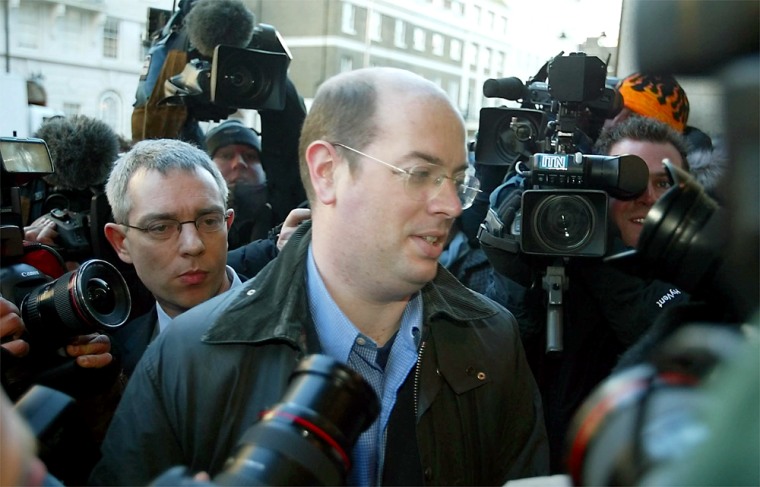BBC reporter Andrew Gilligan resigned Friday after a judicial inquiry criticized his reporting that the government “sexed up” intelligence on Saddam Hussein’s arsenal.
In a statement, Gilligan apologized for mistakes in his May 2003 story. “My departure is at my own initiative,” he said. “But the BBC collectively has been the victim of a grave injustice.”
The defense correspondent's resignation was the third from the British Broadcasting Corp. in as many days. The network’s two top officials also resigned, and the BBC apologized to the government after the inquiry by senior judge Lord Hutton.
Word of Gilligan's departure came shortly after the BBC’s former director-general, who himself resigned on Thursday, charged that the judicial inquiry that harshly criticized the broadcaster’s reporting standards could have damaging implications for the entire media industry.
Greg Dyke said he and other British Broadcasting Corp. officials were shocked by the extent of the criticisms made by Hutton, who said the network was wrong when it quoted an anonymous source as saying the government had “sexed up” intelligence to justify war in Iraq.
Hutton, the senior judge investigating the suicide of arms adviser David Kelly shortly after he was identified as the BBC source, cleared Prime Minister Tony Blair and his officials of wrongdoing in connection with the death and called the network’s report “unfounded.”
“I and others at the BBC, certainly our legal team, were all very surprised by the nature of the report,” Dyke told BBC radio Friday.
“It’s remarkable how he’s (Hutton’s) given the benefit of judgment to virtually everyone in the government and to no one at the BBC.”
BBC wins trust despite verdictThe BBC, whose extensive TV and radio news and entertainment programming gives it a uniquely powerful place in British life, has been badly shaken by Hutton’s assessment that its editorial procedures are “defective.”
Nevertheless, a new poll published Friday suggested that more people in Britain trusted the BBC than the government.
Dyke’s resignation came one day after that of Gavyn Davies, the chairman of the BBC’s board of governors.
Dyke, who acknowledged some mistakes in defense correspondent Gilligan’s story on BBC radio, said he defended the right to broadcast an accurate reflection of Kelly’s concerns.
“Lord Hutton does seem to suggest that is not enough for a broadcaster or a newspaper ... to simply report what a whistle-blower or someone like Dr. Kelly says because they are an authoritative source. You have to demonstrate that it’s true,” Dyke said. “That would change the law in this country.”
“I think it’s not only the BBC who should be concerned if that line is followed, it is every journalist, every broadcaster, every newspaper in this country should be concerned,” he added.
Blair accepts the BBC's apologyThe publicly funded BBC apologized Thursday for the errors it made in the story on the government’s September 2002 dossier, which was at the center of a furious, monthslong battle with the government.
Blair accepted the apology he had long demanded, and said it was time for all involved to move on.
Hutton almost completely exonerated the government, saying it had neither mistreated Kelly nor knowingly “sexed up” the dossier.
Former Foreign Secretary Robin Cook said he accepted that Blair made the decision to go to war in good faith but added that the prime minister must now admit he relied on bad information.
“Now that Lord Hutton has cleared Tony Blair of lying, he is in a strong position,” said Cook, who quit his post as leader of the House of Commons to protest the war. “He will never have a better opportunity to say that he believed in all good faith the intelligence he was given and he gave to Parliament, but that it has turned out to be wildly wrong.”
“If government refuses to learn the lessons from what went wrong, there will always be the risk that they will make the same mistake again,” Cook said.
While the BBC’s reputation was damaged, the controversy also appears to have affected the public’s trust in the government.
An ICM poll for Friday’s Guardian newspaper found that three times as many people trusted the BBC to tell the truth as trusted the government. But a survey of 532 people on Wednesday night also found that 49 percent trusted neither side. It said 10 percent had faith in the government, compared with 31 percent who believed the BBC.
The resignation of Davies as BBC chairman was backed by 38 percent of those asked, and the departure of Dyke was supported by 35 percent.
A separate Populus poll for The Times newspaper found that 36 percent of people viewed Blair less favorably as a result of the Kelly affair, compared with 34 percent whose opinion of the BBC had gone down.
The Populus poll interviewed 500 people on Wednesday and Thursday for The Times. Both polls had a margin of error of plus or minus 3 percentage points.
